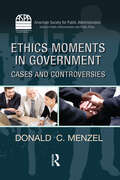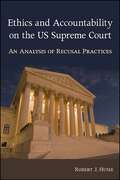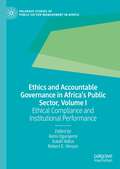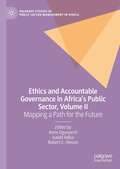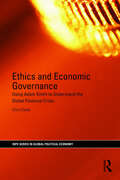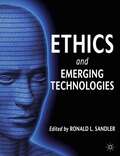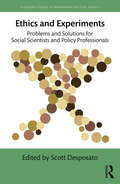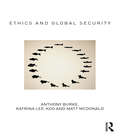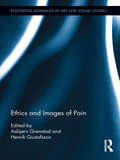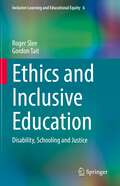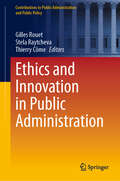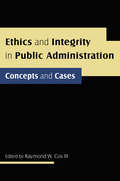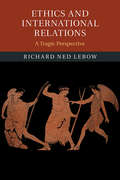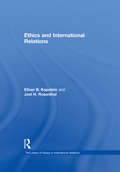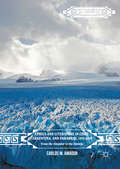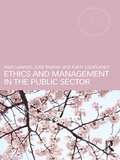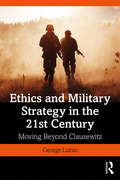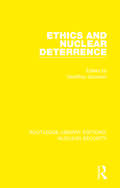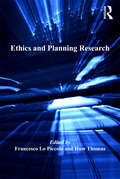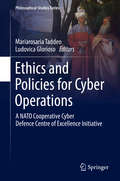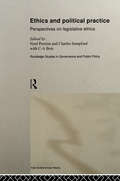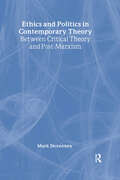- Table View
- List View
Ethics Moments in Government: Cases and Controversies (ASPA Series in Public Administration and Public Policy)
by Donald C. MenzelEthical concerns are among the most common problems public administrators face, yet the issues are often complex, and the correct choices are not always clear. Living up to the public trust is much more than just an act of compliance. It also involves perceiving, preventing, avoiding, and resolving accusations of illegal or unethical behavior, including appearances of inappropriate behavior. Ethics Moments in Government: Cases and Controversies examines how to identify, assess, and resolve the ethical issues and dilemmas that often confront those who govern the cities, counties, states, and federal agencies throughout America. Real Situations, Real Advice Providing a one-stop resource for all those who must contend with thorny ethical issues, this volume presents case studies that vary in complexity and context and are based on real situations. Each case scenario is followed by discussion questions and case assessments by expert practitioners who describe how they would handle the situation. Using a "total immersion" technique, the book encourages readers to be reflexive and analytical in addressing the problems presented and arriving at appropriate solutions. A supplemental CD is included which contains PowerPoint® slide presentations, articles, workshop programs, tests, and links to organizations. For many of the scenarios presented in this volume, there are no easy answers. Practical guidance on reasoning through difficult decision-making situations enables public administrators to acquire the ethical knowledge, skills, abilities, and instincts that will ultimately help them gain the trust of their citizens and advance in their careers.
Ethics and Accountability on the US Supreme Court: An Analysis of Recusal Practices (SUNY series in American Constitutionalism)
by Robert J. HumeDo US Supreme Court justices withdraw from cases when they are supposed to? What happens when the Court is down a member? In Ethics and Accountability on the US Supreme Court, Robert J. Hume provides the first comprehensive examination of the causes and consequences of recusal behavior on the Supreme Court. Using original data, and with rich attention to historical detail including media commentary about recusals, he systematically analyzes the factors that influence Supreme Court recusal, a process which has so far been shrouded in secrecy. It is revealed that justices do not strictly follow the recusal guidelines set by Congress, but at the same time they do not ignore these rules. Overall, justices are selective in their compliance with the recusal statute, balancing ethical considerations against other institutional and policy goals, such as the duty to sit. However, the book also concludes that the impact of recusals on policymaking is more limited than commentators have claimed, raising questions about whether ethics reform is really needed at this time.
Ethics and Accountable Governance in Africa's Public Sector, Volume I: Ethical Compliance and Institutional Performance (Palgrave Studies of Public Sector Management in Africa)
by Kemi Ogunyemi Robert E. Hinson Isaiah AdisaThis book is an excellent resource for academics and students interested in ethics and accountability in the public sector, as well as for practitioners, NGO workers and policymakers. Over the last decades, issues in ethical leadership have become central to the global call for higher moral standards on the part of corporate organisations and their leaders and managers. The book’s chapters investigate these concerns in Africa, where governance gaps often reflect poor leadership. Parenthetically, in 2001, a UNDP report found difficulties in applying anti-corruption laws and managing public institutions in the continent. Twenty years on, significant efforts have been made to improve the situation, yet extensive challenges still subsist. In this first volume, contributors discuss the practice of ethics, anti-corruption, and performance management, and propose solutions, some general to the continent and others country-specific.
Ethics and Accountable Governance in Africa's Public Sector, Volume II: Mapping a Path for the Future (Palgrave Studies of Public Sector Management in Africa)
by Robert Ebo Hinson Kemi Ogunyemi Isaiah AdisaThis book is a fascinating treatment of ethics, governance, and anti-corruption initiatives from a public sector management perspective and is especially relevant for an Africa looking to benefit from the recently launched Africa Continental Free Trade Area.This second part of a two-volume set spans a wide array of contemporary issues. Chapters explore the challenges related to building an ethical climate in Africa’s public sector, what the imperatives of anti-corruption initiatives should be in Africa, ethical orientation in promoting project performance, corporate governance in Zimbabwe’s local authorities and the role of NGOs/CSOs in promoting public sector accountability. On digitalisation, the book discusses the management of Tanzanian public service integrity in the digital era and digital innovation towards sustainable public sector administration in Africa. Public sector management, ethics and corporate governance academics, students, managers and policy makers will find this edited volume critical to improving public sector management in Africa.
Ethics and Business
by Kevin GibsonIn this lively 2007 undergraduate textbook, Kevin Gibson explores the relationship between ethics and the world of business, and how we can serve the interests of both. He builds a philosophical groundwork that can be applied to a wide range of issues in ethics and business, and shows readers how to assess dilemmas critically and work to resolve them on a principled basis. Using case studies drawn from around the world, he examines topics including stakeholder responsibilities, sustainability, corporate social responsibility, and women and business. Because business can no longer be isolated from its effects on communities and the environment, these concerns are brought to the forefront. The book also captures the dynamic nature of business ethics in the era of globalization where jobs can be outsourced, products are made of components from scores of countries and sweatshops often provide the cheap goods the public demands.
Ethics and Economic Governance: Using Adam Smith to understand the global financial crisis (RIPE Series in Global Political Economy)
by Chris ClarkeThis book seeks to explore the ethical dimensions of economic governance through an engagement with Adam Smith and a critical analysis of economistic understandings of the Global Financial Crisis. It examines ethical and political dilemmas associated with key aspects of the financialisation of Anglo-American economy and society, including systems of asset-based welfare, modern risk management and debt. In the wake of the financial crisis, recognition of the way in which everyday lives and life chances are tied into global finance is widespread. Yet few contributions in IPE explicitly tackle this issue as a question of ethics. By developing Adam Smith’s under-utilised account of how market-oriented behaviour is constituted through a process of ‘sympathy’, this book provides an innovative way of understanding contemporary issues of economic governance and the possibilities and limits for intervention within it. By taking Adam Smith’s moral philosophy seriously, it becomes evident that the ever-deeper enmeshing of finance in our everyday lives is a failed experiment. Turning the common understanding of Smith on its head, we can also turn accepted wisdom about the recent financial crisis on its head and see the urgency of making better known the ethico-political contestation that lies at the heart of financial market relations. It will be of interest to students and scholars of IPE as well as those across the social sciences who wish to question the foundations of contemporary economy and society.
Ethics and Emerging Technologies
by Ronald SandlerFirst and only undergraduate textbook that addresses the social and ethical issues associated with a wide array of emerging technologies, including genetic modification, human enhancement, geoengineering, robotics, virtual reality, artificial meat, neurotechnologies, information technologies, nanotechnology, sex selection, and more.
Ethics and Experiments: Problems and Solutions for Social Scientists and Policy Professionals (Routledge Studies in Experimental Political Science)
by Scott DesposatoFor most of political science's history, discussions about professional ethics had nothing to do with human subjects. Professional ethics involved integrity in the classroom, fair tenure and promotion rule, and the careful avoidance of plagiarism. As most research was observational, there was little need for attention to how scholarly activities might directly affect the subjects of our work. Times have changed. The dramatic growth in the use of experiments in social science, especially overseas, is generating unexpected ethical controversies. The purpose of this volume is to identify, debate, and propose practical solutions to the most critical of these new ethical issues. A leading team of internationally distinguished political science scholars presents the first examination of the practical and ethical challenges of research with human subjects in social science and policy studies. Part 1 examines contextual challenges provided by experiments conducted overseas - questions of culture, religion, security, and poverty. Part 2 examines questions of legal constraints on research, focusing on questions of foreign review of international experiments. Part 3 tackles the critical issues in field experiments, including deception and consent, impact on elections and careers, the boundaries of the public officials' exemption, and the use of partner organizations to avoid Institutional Review Body (IRB) review. Part 4 considers strategies for the future, including training and education, IRB reform, institutional changes, and norm development.
Ethics and Global Security: A cosmopolitan approach (Routledge Critical Security Studies)
by Anthony Burke Katrina Lee-Koo Matt McDonaldThis book will be the first systematic examination of the role that ethics plays in international security in both theory and practice, and offers the reader a concrete ethics for global security. Questions of morality and ethics have long been central to global security, from the death camps, world wars and H-bombs of the 20th century, to the humanitarian missions, tsunamis, terrorism and refugees of the 21st. This book goes beyond the Just War tradition to demonstrate how ethical commitments influence security theory, policy and international law, across a range of pressing global challenges. The book highlights how, from patrolling a territorial border to maintaining armed forces, security practices have important ethical implications, by excluding some from consideration, presenting others as potential threats and exposing them to harm, and licensing particular actions. While many scholars and practitioners of security claim little interest in ethics, ethics clearly has an interest in them. This innovative book extends the traditional agenda of war and peace to consider the ethics of force short of war such as sanctions, deterrence, terrorism, targeted killing, and torture, and the ethical implications of new security concerns such as identity, gender, humanitarianism, the responsibility to protect, and the global ecology. It advances a concrete ethics for an era of global threats, and makes a case for a cosmopolitan approach to the theory and practice of security that could inspire a more just, stable and inclusive global order. This book fills an important gap in the literature and will be of much interest to students of ethics, security studies and international relations.
Ethics and Images of Pain (Routledge Advances in Art and Visual Studies)
by Asbjørn Grønstad Henrik GustafssonFew phenomena are as formative of our experience of the visual world as displays of suffering. But what does it mean to have an ethical experience of disturbing or traumatizing images? What kind of ethical proposition does an image of pain mobilize? How may the spectator learn from and make use of the painful image as a source of ethical reflection? Engaging with a wide range of visual media--from painting, theatre, and sculpture, to photography, film, and video--this interdisciplinary collection of essays by leading and emerging scholars of visual culture offers a reappraisal of the increasingly complex relationship between images of pain and the ethics of viewing. Ethics and Images of Pain reconsiders the persistent and ever pertinent nexus of aesthetics and ethics, the role of painful images as generators of unpredictable forms of affect, the moral transformation of spectatorship, the ambivalence of the witness and the representation of afflication as a fundamental form of our shared scopic experience. The instructive and illuminating essays in the collection introduce a phenomenological context in which to make sense of our current ecology of excruciating images, one that accentuates notions of responsibility, empathy, and imagination. Contributors trace the images of pain across a miscellany of case studies, and amongst the topics addressed are: the work of artists as disparate as Doris Salcedo, Anselm Kiefer and Bendik Riis; photographs from Abu Ghraib and Rwanda; Hollywood war films and animated documentaries; performances of self-immolations and incidents of police brutality captured on mobile phones.
Ethics and Inclusive Education: Disability, Schooling and Justice (Inclusive Learning and Educational Equity #6)
by Gordon Tait Roger SleeThis book reveals the entanglement of ethics, rights and justice in education. It aims to develop everyday philosophy to guide choices as we continue to attempt to make schools places for all comers. The authors offer education as a social good, a building block for inclusive communities. This assumes an ethical predisposition. Ethics and inclusive education takes the reader on a journey through the conceptual foundations of ethics, rights and justice to assist us to build a formulation of the fair or just society and the way ethical approaches to schooling may support or unravel that.
Ethics and Innovation in Public Administration (Contributions to Public Administration and Public Policy)
by Gilles Rouet Thierry Côme Stela RaytchevaThis edited volume analyzes the ethics of innovations in the public sector in Europe. The book presents a theoretical analysis of empirical cases, deepening the understanding of innovation in public administration by identifying common processes across various local contexts. It also delves into the study of the European Union's ethics and values, exploring their impact on innovation at both European and local levels. Additionally, the book features comprehensive case studies, encompassing different sectors, professions, and statuses within public administration, providing a multifaceted examination of innovation's complexities. By considering multiple perspectives, including those of citizens, politicians, managers, trade unions, NGOs, and political leaders, the book offers a holistic understanding of the ethical challenges associated with innovation in public administration. It also addresses intrapreneurship, successful initiatives, struggles and resistance to change, training for elected representatives, and the integration of an ethical approach into local authority communications. As such this volume will be an essential resource for scholars, practitioners, policymakers, and anyone navigating the intricate landscape of ethical decision-making in European public administration.
Ethics and Integrity in British Politics
by Nicholas Allen Sarah BirchPublic perceptions of political ethics are at the heart of current political debate. Drawing on original data, this book is the first general account of popular understandings of political ethics in contemporary British politics. It offers new insights into how citizens understand political ethics and integrity and how they form judgments of their leaders. By locating these insights against the backdrop of contemporary British political ethics, the book shows how current institutional preoccupations with standards of conduct all too often miss the mark. While the use of official resources is the primary focus of much regulation, politicians' consistency, frankness and sincerity, which citizens tend to see in terms of right and wrong, are treated as 'normal politics'. The authors suggest that new approaches may need to be adopted if public confidence in politicians' integrity is to be restored.
Ethics and Integrity in Public Administration: Concepts and Cases
by Raymond W Cox"Ethics and Integrity in Public Administration" presents cutting-edge perspectives on the role of ethics in public sector management - what it is and where it is going. The contributors include a cross-section of authoritative authors from around the globe, and from both the academy and government. They cover a wide range of topics, diverse theoretical and conceptual paradigms, and global examples, and provide a broader view than what is typically offered in other books. The book includes both theoretical insights and commentaries grounded in practice. Chapters are divided into three parts: Ethical Foundations and Perspectives, Ethical Management and Ethical Leadership, and International and Comparative Perspectives.
Ethics and International Relations: A Tragic Perspective (Pioneers In Arts, Humanities, Science, Engineering, Practice Ser. #5)
by Richard Ned LebowLebow demonstrates that foreign policies consistent with generally accepted ethical norms are more likely to succeed, and those at odds with them to fail. Constructing original data sets and analyzing multiple case studies, Lebow makes an empirical case for ethics in international relations. His approach looks to create a productive dialogue between those who ask primarily 'ought' questions and those who pose 'is' questions. The former want to establish appropriate criteria for the behaviour of state and non-state actors and the discourses that lead to their policy decisions, whereas scholars who pose 'is' questions are concerned with how political actors behave and the principles and assumptions that might explain their behaviour. Lebow bridges the gap between 'is' and 'ought' questions by making an instrumental argument in favour of ethical foreign policy. He examines policymaking as well as policy, offering ethical guidelines for policymaking that are likely to result in more successful policies.
Ethics and International Relations: Lessson From The 1990s (The Library of Essays in International Relations)
by Joel H. RosenthalThis volume offers a new dimension to realist theories about world politics. It questions both the theoretical and empirical foundations of much of traditional realist thought by offering realist-oriented analyses that emphasize the possibilities of cooperation and accommodation through agreement over common motivations and concerns. The articles in this volume demonstrate that moral considerations can and do play a significant role in shaping state behavior and that despair about the possibility of improving the systems and institutions within which we live is unwarranted. Specific points of normative convergence are raised in some detail, especially on issues of war, membership and authority, humanitarian concern and the social consequences of globalization. Three ethical concepts form the core of the 'realism reconsidered' argued for here, namely, the ideas of pluralism, rights and fairness.
Ethics and Literature in Chile, Argentina, and Paraguay, 1970-2000
by Carlos M. AmadorThis book argues for a new reading of the political and ethical through the literatures of Argentina, Chile, and Paraguay from 1970-2000. Carlos Amador reads a series of examples from the last dictatorship and the current post-dictatorship period in the Southern Cone, including works by Augusto Roa Bastos, Roberto Bolaño, Ceferino Reato, Horacio Verbitsky, Nelly Richard, Diamela Eltit, and Willy Thayer, with the goal of uncovering the logic behind their conceptions of belonging and rejection. Focusing on theoretical concepts that make possible the formation of any and all communities, this study works towards a vision of literature as essential to the structure of ethics.
Ethics and Management in the Public Sector (Masters in Public Management)
by Alan Lawton Julie Rayner Karin LasthuizenGrappling with ethical issues is a daily challenge for those working in organizations that deliver public services. Such services are delivered through an often bewildering range of agencies and amidst this constant change, there are fears that a public service ethos, a tradition of working in the public interest, becomes blurred. Using extensive vignettes and case studies, Ethics and Management in the Public Sector illuminates the practical decisions made by public officials. The book takes a universal approach to ethics reflecting the world-wide impact of public service reforms and also includes discussions on how these reforms impact traditional vales and principles of public services. This easy-to-use textbook is a definitive guide for postgraduate students of public sector ethics, as well as students of public management and administration more generally.
Ethics and Military Strategy in the 21st Century: Moving Beyond Clausewitz (War, Conflict and Ethics)
by George R. Lucas, Jr.This book examines the importance of "military ethics" in the formulation and conduct of contemporary military strategy. Clausewitz’s original analysis of war relegated ethics to the side-lines in favor of political realism, interpreting the proper use of military power solely to further the political goals of the state, whatever those may be. This book demonstrates how such single-minded focus no longer suffices to secure the interest of states, for whom the nature of warfare has evolved to favor strategies that hold combatants themselves to the highest moral and professional standards in their conduct of hostilities. Waging war has thus been transformed in a manner that moves beyond Clausewitz’s original conception, rendering political success wholly dependent upon the cultivation and exercise of discerning moral judgment by strategists and combatants in the field. This book utilizes a number of perspectives and case studies to demonstrate how ethics now plays a central role in strategy in modern armed conflict. This book will be of much interest to students of just war, ethics, military strategy, and international relations.
Ethics and Nuclear Deterrence (Routledge Library Editions: Nuclear Security)
by Geoffrey GoodwinAs nuclear weapons become ever more sophisticated, so the deterrence debate becomes increasingly complex. The ‘Ban the Bomb’ slogans of the 1950s had been replaced by cries for ‘nuclear-free zones’, and talk of ‘megatonnage’ and ‘fallout’ had given way to talk of ‘tactical’ nuclear weapons and ‘limited strike capability’. Originally published in 1982, this book considers the ethical issues raised by nuclear policies and by the debate between proponents of the multilateralist/unilateralist approaches to disarmament and arms control at the time. It is not, like so many books on the subject, an ideological statement: there are essays by defence strategists which put the case for deterrence and essays by academics and churchmen which strenuously oppose it. The book also includes an essay on attempts to mitigate the appalling brutality of the many ‘conventional’ wars since 1945. At a time when the rhetoric and misinformation produced on both sides of the debate continued to obscure many vital issues, this book was welcome, sensible and necessary.
Ethics and Philosophical Critique in William James
by Sarin MarchettiMarchetti offers a revisionist account of James's contribution to moral thought in the light of his pragmatic conception of philosophical activity. He sketches a composite picture of a Jamesian approach to ethics revolving around the key notion and practice of a therapeutic critique of one's ordinary moral convictions and style of moral reasoning.
Ethics and Planning Research
by Francesco Lo PiccoloThe consideration of ethics in social research has gained increasing prominence in the past few years, particularly research which seeks to inform public policy. This important and unique book provides a thorough examination of the issues relating to research ethics in planning for an international audience. The authors examine alternative frameworks within which ethical action can be discussed and critically describe the key institutional arrangements surrounding the management of ethical behaviour in research. Also included are highly relevant accounts of ethical challenges faced in planning research.
Ethics and Policies for Cyber Operations
by Mariarosaria Taddeo Ludovica GloriosoThis book presents 12 essays that focus on the analysis of the problems prompted by cyber operations (COs). It clarifies and discusses the ethical and regulatory problems raised by the deployment of cyber capabilities by a state's army to inflict disruption or damage to an adversary's targets in or through cyberspace. Written by world-leading philosophers, ethicists, policy-makers, and law and military experts, the essays cover such topics as the conceptual novelty of COs and the ethical problems that this engenders; the applicability of existing conceptual and regulatory frameworks to COs deployed in case of conflicts; the definition of deterrence strategies involving COs; and the analysis of models to foster cooperation in managing cyber crises. Each essay is an invited contribution or a revised version of a paper originally presented at the workshop on Ethics and Policies for Cyber Warfare, organized by the NATO Cooperative Cyber Defence Centre of Excellence in collaboration with the University of Oxford. The volume endorses a multi-disciplinary approach, as such it offers a comprehensive overview of the ethical, legal, and policy problems posed by COs and of the different approaches and methods that can be used to solve them. It will appeal to a wide readership, including ethicists, philosophers, military experts, strategy planners, and law- and policy-makers.
Ethics and Political Practice: Perspectives on Legislative Ethics (Routledge Studies in Governance and Public Policy #Vol. 2)
by Charles Sampford Noel Preston C-A BoisScrutinizing the practice of legislators and politicians from an ethical perspective, this work looks closely at various methods to facilitate ethical conduct.
Ethics and Politics in Contemporary Theory Between Critical Theory and Post-Marxism (Routledge Innovations in Political Theory #Vol. 4)
by Mark DevenneyIn addressing the political and theoretical debates between critical and post-Marxist theorists, this book discusses the politics of communication and rationality, subjectivity, sovereignty, ethics and deliberative democracy, considering questions such as:* Does the theory of communicative action justify deliberative democracy?* Is a theory of hegemony compatible with an account which relies upon an ideal of communicative success?* Is autonomy a good which should be fostered?* Can the ideal of democracy extend beyond the nation state?* Does post-Marxism have anything interesting to say about ethics?Analysing the work of Ernesto Laclau and Jürgen Habermas - as representatives of different choices made in regard to theory, politics and morality - Ethics and Politics in Contemporary Theory develops a critical response to the contrasting conclusions of these approaches.
